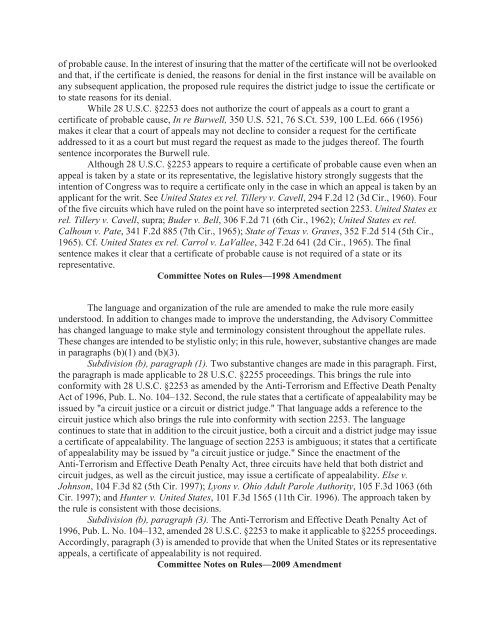Federal Rules of Appellate Procedure 2014-2015, 2014a
Federal Rules of Appellate Procedure 2014-2015, 2014a
Federal Rules of Appellate Procedure 2014-2015, 2014a
Create successful ePaper yourself
Turn your PDF publications into a flip-book with our unique Google optimized e-Paper software.
<strong>of</strong> probable cause. In the interest <strong>of</strong> insuring that the matter <strong>of</strong> the certificate will not be overlooked<br />
and that, if the certificate is denied, the reasons for denial in the first instance will be available on<br />
any subsequent application, the proposed rule requires the district judge to issue the certificate or<br />
to state reasons for its denial.<br />
While 28 U.S.C. §2253 does not authorize the court <strong>of</strong> appeals as a court to grant a<br />
certificate <strong>of</strong> probable cause, In re Burwell, 350 U.S. 521, 76 S.Ct. 539, 100 L.Ed. 666 (1956)<br />
makes it clear that a court <strong>of</strong> appeals may not decline to consider a request for the certificate<br />
addressed to it as a court but must regard the request as made to the judges there<strong>of</strong>. The fourth<br />
sentence incorporates the Burwell rule.<br />
Although 28 U.S.C. §2253 appears to require a certificate <strong>of</strong> probable cause even when an<br />
appeal is taken by a state or its representative, the legislative history strongly suggests that the<br />
intention <strong>of</strong> Congress was to require a certificate only in the case in which an appeal is taken by an<br />
applicant for the writ. See United States ex rel. Tillery v. Cavell, 294 F.2d 12 (3d Cir., 1960). Four<br />
<strong>of</strong> the five circuits which have ruled on the point have so interpreted section 2253. United States ex<br />
rel. Tillery v. Cavell, supra; Buder v. Bell, 306 F.2d 71 (6th Cir., 1962); United States ex rel.<br />
Calhoun v. Pate, 341 F.2d 885 (7th Cir., 1965); State <strong>of</strong> Texas v. Graves, 352 F.2d 514 (5th Cir.,<br />
1965). Cf. United States ex rel. Carrol v. LaVallee, 342 F.2d 641 (2d Cir., 1965). The final<br />
sentence makes it clear that a certificate <strong>of</strong> probable cause is not required <strong>of</strong> a state or its<br />
representative.<br />
Committee Notes on <strong>Rules</strong>—1998 Amendment<br />
The language and organization <strong>of</strong> the rule are amended to make the rule more easily<br />
understood. In addition to changes made to improve the understanding, the Advisory Committee<br />
has changed language to make style and terminology consistent throughout the appellate rules.<br />
These changes are intended to be stylistic only; in this rule, however, substantive changes are made<br />
in paragraphs (b)(1) and (b)(3).<br />
Subdivision (b), paragraph (1). Two substantive changes are made in this paragraph. First,<br />
the paragraph is made applicable to 28 U.S.C. §2255 proceedings. This brings the rule into<br />
conformity with 28 U.S.C. §2253 as amended by the Anti-Terrorism and Effective Death Penalty<br />
Act <strong>of</strong> 1996, Pub. L. No. 104–132. Second, the rule states that a certificate <strong>of</strong> appealability may be<br />
issued by "a circuit justice or a circuit or district judge." That language adds a reference to the<br />
circuit justice which also brings the rule into conformity with section 2253. The language<br />
continues to state that in addition to the circuit justice, both a circuit and a district judge may issue<br />
a certificate <strong>of</strong> appealability. The language <strong>of</strong> section 2253 is ambiguous; it states that a certificate<br />
<strong>of</strong> appealability may be issued by "a circuit justice or judge." Since the enactment <strong>of</strong> the<br />
Anti-Terrorism and Effective Death Penalty Act, three circuits have held that both district and<br />
circuit judges, as well as the circuit justice, may issue a certificate <strong>of</strong> appealability. Else v.<br />
Johnson, 104 F.3d 82 (5th Cir. 1997); Lyons v. Ohio Adult Parole Authority, 105 F.3d 1063 (6th<br />
Cir. 1997); and Hunter v. United States, 101 F.3d 1565 (11th Cir. 1996). The approach taken by<br />
the rule is consistent with those decisions.<br />
Subdivision (b), paragraph (3). The Anti-Terrorism and Effective Death Penalty Act <strong>of</strong><br />
1996, Pub. L. No. 104–132, amended 28 U.S.C. §2253 to make it applicable to §2255 proceedings.<br />
Accordingly, paragraph (3) is amended to provide that when the United States or its representative<br />
appeals, a certificate <strong>of</strong> appealability is not required.<br />
Committee Notes on <strong>Rules</strong>—2009 Amendment


















